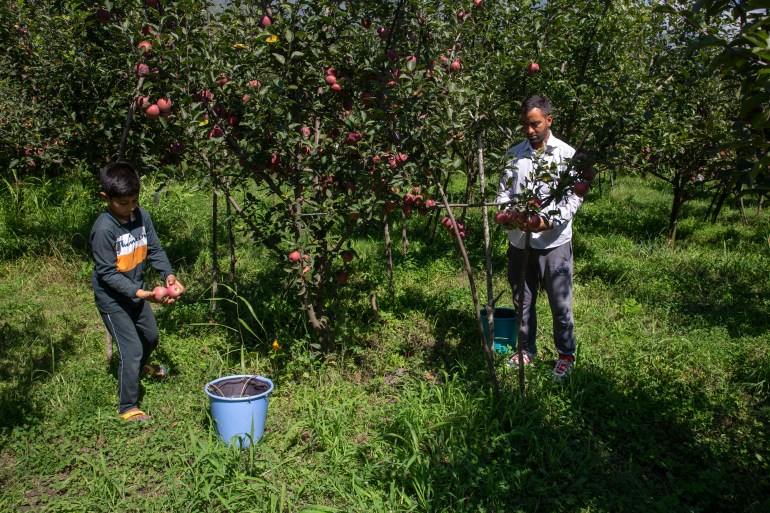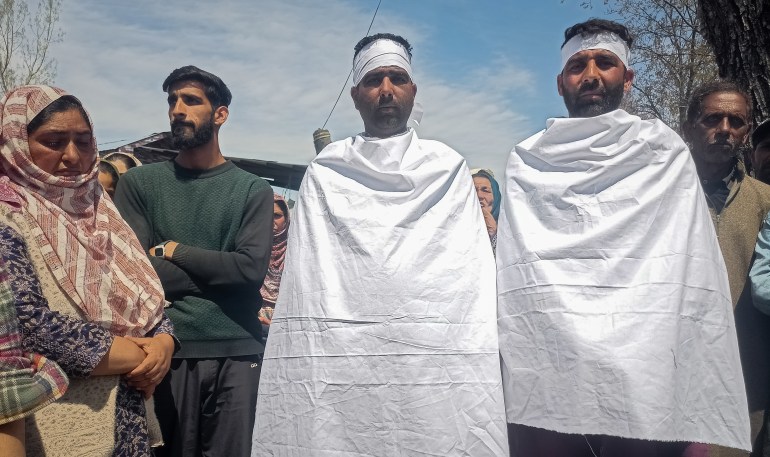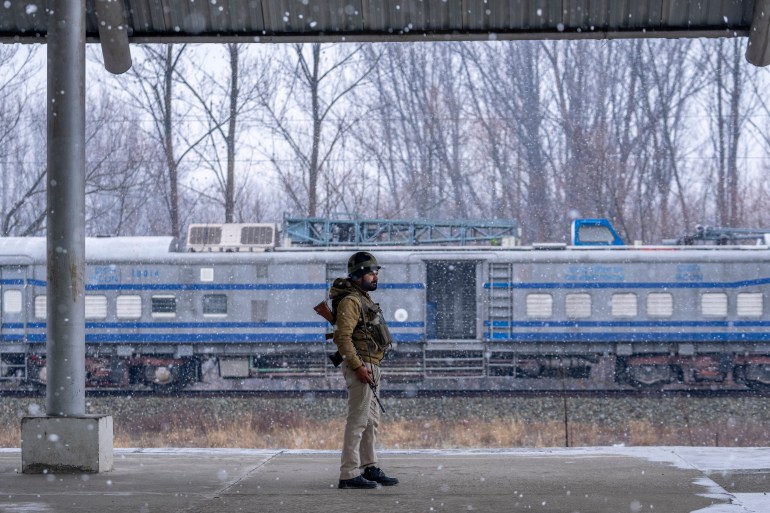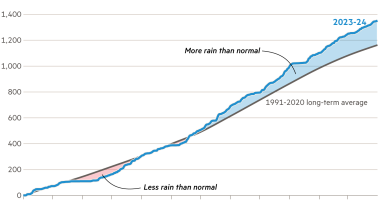Indian-administered Kashmir – Muhammad Shafi was working in his apple orchard in October last year, in Indian-administered Kashmir, when a group of men rushed in and started measuring his land without asking for his approval.
When he asked the men who they were and what were they doing on his land, Shafi said their response left him stunned. They were government officials sent to mark and measure his orchard for the construction of a railway line.
“They said the land will be used to lay a railway track and a road,” Shafi, 65, told Al Jazeera at his home in the Himalayan region’s Bijbehara area of Anantnag district. “They asked us to refrain from working on our lands.”
Since the officials’ visit, Shafi’s 1,500 sq metre (16,145 sq ft) apple farm has been deserted. Buds have formed on the branches, trees are mulched and it is time to spray them with pesticides.
But Shafi cannot tend to his farm, which is now lined with two 15cm (0.5 ft) concrete poles earmarked by the authorities for the proposed 77km (48-mile) Anantnag-Bijbehara-Pahalgam railway line, one among five such projects totalling about 190km (118 miles) across the picturesque Kashmir valley.
The land to be acquired for the construction is highly fertile for growing apples, the best-known export from the region.

‘Apple bowl of Kashmir’
Apple farming is the largest employment generator in Indian-administered Jammu and Kashmir, with nearly 3.5 million farmers – 27 percent of the region’s population – involved in growing the fruit, whose export contributes more than 8 percent to the region’s gross domestic product (GDP).
The apple growers say they have invested their entire lives – and their limited resources – in raising the orchards, only for them to be forcefully taken away by the authorities. Shafi’s orchard effectively belongs to the government now, an acquisition he did not sign up for.
Many residents said that government survey teams came to measure their orchards accompanied by police and security forces – in effect to prevent any meaningful resistance from farmers. “We are not even allowed to protest or raise our voice,” said Shafi. “We are helpless.”
Wamiq* from southern Kashmir’s Shopian district said he received a notice from the government on February 23, which said that his 5,000 sq metre (54,000 sq ft) apple orchard would be taken over by the government to construct a railway line.
Still, many Kashmiri farmers have taken to street protests since the land acquisition began. At one such protest in Shopian, known as the “apple bowl of Kashmir”, Wamiq said the farmers had little option but to fight for their land.
“There is already a dearth of job opportunities and now they are depriving us from the only means we have. We don’t have any other skill, we don’t know how to survive without this and no money would compensate [for] the loss,” the 25-year-old said.
“We will anyway die of starvation if they take our land, so it is better to die while fighting for our land,’’ he added.

Connectivity boon and fears
To be sure, Kashmiris have long sought better connectivity. The Kashmir valley region has one national highway that often gets blocked by landslides and falling rocks during inclement weather in summer and snow during the winter, disconnecting it from the rest of the country, sometimes for days.
Three decades ago, in the mid-1990s, the Indian government began a railway project in several phases, to end that dependence on the highway. This project is expected to be completed by August and will for the first time connect Kashmir to the rest of India through an all-weather rail line.
Last year, the Indian government approved a project to extend this rail initiative further, within Kashmir. The move could help improve transport within Kashmir.
But many Kashmiris say the construction of the railway line would mean acquiring nearly 278 hectares (686 acres) of highly fertile lands, most of which are home to apple orchards.
Shamshada Akhtar, a farmer in Anantnag, is among those who may soon lose their orchard. “We spent ample money raising the orchard – the labour costs, fertilisers, pesticides every year for more than 12 years… For what? Only to let authorities take it away on some meagre compensation,” the 43-year-old said.
Officials have not disclosed details of the compensation that would be paid but many growers say they do not want the money.
“One-time compensation is not going to feed us forever. The orchards are not only the source of livelihood for us but for our future generations,” said Akhtar. “This is an emotion for growers like us.”
The fear of losing land – and livelihoods – among residents in Indian-administered Kashmir is compounded by distrust of Prime Minister Narendra Modi’s Hindu majoritarian Bharatiya Janata Party (BJP) government, which in 2019 scrapped the region’s special semi-autonomous status and brought it under the direct control of New Delhi.
The government claimed the move would bring peace, speed up investment and create more jobs in the country’s largest Muslim-majority region, which for decades has been the site of a bloody rebellion against Indian rule and in which tens of thousands of people, most of them civilians, have been killed.
Now there are rumours, said Shafi, that the land taken over for railway projects will be used primarily to improve connectivity to a Hindu pilgrimage site in Pahalgam, a famous tourist resort in the Anantnag district.
Altaf Thakur, a regional spokesman for the BJP, rejected those rumours. The railway lines, he said, “will be used by all the people throughout the year and no religious colour should be given to it”.

‘Neither needed nor wanted’
Then there are ecological concerns as well. Some experts believe the railway lines will reduce forest cover, posing a threat to the local economy and ecology.
Kashmiri environmentalist Raja Muzaffar Bhat told Al Jazeera the authorities should instead “put in efforts to save the land instead of using it for construction purposes”.
“The main railway connection was much-needed but the railway lines through Shopian, Anantnag and other districts require ample trees to be cut, which will put the livelihoods of lakhs [hundreds of thousands] of people in the region at stake,” he said.
Bhat argued the land acquisition is also a violation of a law implemented in 2019 that guaranteed fair compensation, transparency and rehabilitation for those affected by such infrastructure projects. “It’s a democratic law in which you have to consult every stakeholder before acquiring any land,” he said. “Without taking the locals into confidence, putting concrete poles on the land without any notice is unlawful.”
But BJP spokesman Thakur dismissed the charge that laws have been violated. “This step has been taken after taking the environmental factors into consideration and after consulting all stakeholders in the region,” he told Al Jazeera.
When asked about allegations of land grabs by the government to expand the railways, he said: “At this moment, I don’t know what people want but for these railway projects, some land would be needed and some trees will be cut during the process. So we all should wholeheartedly welcome this development in the region.”
Michael Kugelman, the director of the South Asia Institute at the Wilson Center in Washington, DC, said infrastructure projects “seen as more innocuous” before 2019 are now regarded by the Kashmiris “with more suspicion”.
“Especially given that for many in Kashmir, it’s not a lack of development that concerns the local residents but more so, the level of control of the government in New Delhi,” he said. “For many in Kashmir, it’s a case of New Delhi bringing in more of what is neither needed nor wanted.”
Kugelman said that there is “no reason to believe” that locals would have problems with temporary visitors, such as the pilgrims or the tourists. “The concern is more about the potential for new investors and other residents that plan to come for the long haul – and what that may mean in terms of longer-term social and demographic implications.”
Meanwhile, at Bijbehara, Shafi, a father of four, said he initially worked as a labourer in others’ apple orchards to feed his family until he was able to buy a farm for himself. He said the trees he worked on for nearly a decade have finally started bearing apples, fetching the family about 500,000 rupees (about $6,000) annually.
Now, he rarely visits his orchard. “It distresses me each time I see my orchard, the budding flowers on trees,” he said as tears well up in his eyes.
“It haunts me to even think about how I would be able to provide a livelihood to my children.”
*One farmer’s name has been changed at his request because of fears of retribution from the government.
Read More: World News | Entertainment News | Celeb News
Aljazera










